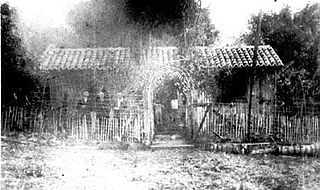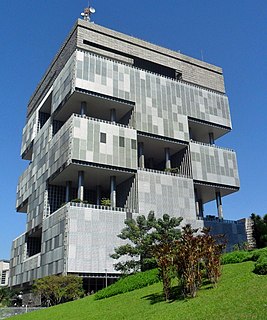
Petróleos Mexicanos, which translates to Mexican Petroleum, but is trademarked and better known as Pemex, is the Mexican state-owned petroleum company, created in 1938 by nationalization or expropriation of all private, foreign, and domestic oil companies at that time. Pemex had total assets worth $415.75 billion, and was the world's second-largest non-publicly listed company by total market value, and Latin America's second-largest enterprise by annual revenue as of 2009, surpassed only by Petrobras. The majority of its shares are not listed publicly and are under control of the Mexican government, with the value of its publicly listed shares totaling $202 billion in 2010, representing approximately one quarter of the company's total net worth.

Juscelino Kubitschek de Oliveira, known also by his initials JK, was a prominent Brazilian politician who served as the 21st President of Brazil from 1956 to 1961. His term was marked by economic prosperity and political stability, being most known for the construction of a new capital, Brasília.

The Confederados were some 10,000 to 20,000 Confederate American refugees who fled to Brazil, chiefly to the state of São Paulo, from the Southern United States after the American Civil War. Although many eventually returned to the United States after Reconstruction, some remained and descendants of Confederados can be found in many cities throughout Brazil. The city of Americana, Brazil was founded by these Americans.
Petróleo Brasileiro S.A. — Petrobras, more commonly known as simply Petrobras, is a semi-public Brazilian multinational corporation in the petroleum industry headquartered in Rio de Janeiro, Brazil. The company's name translates to Brazilian Petroleum Corporation — Petrobras.

Inconfidência Mineira was an unsuccessful separatist movement in Brazil in 1789. It was the result of a confluence of external and internal causes in what was then a Portuguese colony. The external inspiration was the independence of thirteen of the British colonies in North America following the American Revolutionary War, a development that impressed the intellectual elite of particularly the captaincy of Minas Gerais. The main internal cause of the conspiracy was the decline of gold mining in that captaincy. As gold became less plentiful, the region's gold miners faced increasing difficulties in fulfilling tax obligations to the crown, the tax over gold was one-fifth. When the captaincy could not satisfy the royal demand for gold, it was burdened with an additional tax on gold, called derrama.

Copaiba is a stimulant oleoresin obtained from the trunk of several pinnate-leaved South American leguminous trees. The thick, transparent exudate varies in color from light gold to dark brown, depending on the ratio of resin to essential oil. Copaiba is used in making varnishes and lacquers.

CNP Assurances S.A. is a major French insurance corporation. CNP stands for Caisse Nationale de Prévoyance. It is listed on the Fortune Global 500. The company was formed in 1959 as a subsidiary of Caisse des dépôts et consignations, which continues to hold approximately 40% of the company. Agence des participations de l'État also owned 1.1% for the French State.
Mineral rights are property rights to exploit an area for the minerals it harbors. Mineral rights can be separate from property ownership. Mineral rights can refer to sedentary minerals that do not move below the Earth's surface or fluid minerals such as oil or natural gas. There are three major types of mineral property; unified estate, severed or split estate, and fractional ownership of minerals.

Brazilian industry has its earliest origin in workshops dating from the beginning of the 19th century. Most of the country's industrial establishments appeared in the Brazilian southeast, and, according to the Commerce, Agriculture, Factories and Navigation Joint, 77 establishments registered between 1808 and 1840 were classified as “factories” or “manufacturers”. However, most, about 56 establishments, would be considered workshops by today's standards, directed toward the production of soap and tallow candles, snuff, spinning and weaving, foods, melting of iron and metals, wool and silk, amongst others. They used both slaves and free laborers.

The Ministry of Foreign Affairs conducts Brazil's foreign relations with other countries. It is commonly referred to in Brazilian media and diplomatic jargon as Itamaraty, after the palace which houses the ministry. As of 1 January 2019 the ministry is headed by Chancellor Ernesto Araújo.

Brazil is the 10th largest energy consumer in the world and the largest in South America. It is an important oil and gas producer in the region and the world's second largest ethanol fuel producer. The government agencies responsible for energy policy are the Ministry of Mines and Energy (MME), the National Council for Energy Policy (CNPE), the National Agency of Petroleum, Natural Gas and Biofuels (ANP) and the National Agency of Electricity (ANEEL). State-owned companies Petrobras and Eletrobrás are the major players in Brazil's energy sector, as well as Latin America's.
Oil and gas law in the United States is the branch of law that pertains to the acquisition and ownership rights in oil and gas both under the soil before discovery and after its capture, and adjudication regarding those rights.
The mining of minerals in Nigeria accounts for only 0.3% of its GDP, due to the influence of its vast oil resources. The domestic mining industry is underdeveloped, leading to Nigeria having to import minerals that it could produce domestically, such as salt or iron ore. Rights to ownership of mineral resources is held by the Federal government of Nigeria, which grants titles to organizations to explore, mine, and sell mineral resources. Organized mining began in 1903 when the Mineral Survey of the Northern Protectorates was created by the British colonial government. A year later, the Mineral Survey of the Southern Protectorates was founded. By the 1940s, Nigeria was a major producer of tin, columbite, and coal. The discovery of oil in 1956 hurt the mineral extraction industries, as government and industry both began to focus on this new resource. The Nigerian Civil War in the late 1960s led many expatriate mining experts to leave the country. Mining regulation is handled by the Ministry of Solid Minerals Development, which oversees the management of all mineral resources. Mining law is codified in the Federal Minerals and Mining Act of 1999. Historically, Nigeria's mining industry was monopolized by state-owned public corporations. This led to a decline in productivity in almost all mineral industries. The Obasanjo administration began a process of selling off government-owned corporations to private investors in 1999.
Energy in Benin is derived from multiple sources, including, oil and natural gas.
Even though progress has been made in conserving Brazil’s landscapes, the country still faces serious threats due to its historica land use. Amazonian forests substantially influence regional and global climates and deforesting this region is both a regional and global driver of climate change due to the high amounts of deforestation and habitat fragmentation that have occurred this region.

Mineral industry of Colombia refers to the extraction of valuable minerals or other geological materials in Colombia. Colombia is well-endowed with minerals and energy resources. It has the largest coal reserves in Latin America, and is second to Brazil in hydroelectric potential. Estimates of petroleum reserves in 1995 were 3.1 billion barrels (490,000,000 m3). Colombia also possesses significant amounts of nickel and gold. Other important metals included platinum and silver, which were extracted in much smaller quantities. Colombia also produces copper, small amounts of iron ore, and bauxite. Nonmetallic mined minerals include salt, limestone, sulfur, gypsum, dolomite, barite, feldspar, clay, magnetite, mica, talcum, and marble. Colombia also produces most of the world's emeralds. Despite the variety of minerals available for exploitation, Colombia still had to import substances such as iron, copper, and aluminum to meet its industrial needs.

PetroBangla is a government-owned national oil company of Bangladesh. It explores, produces, transports, manages and sells oil, natural gas and other mineral resources. It also concludes production sharing agreements with other international oil companies for exploration and development of oil and gas resources in Bangladesh.
The petroleum fiscal regime of a country is a set of laws, regulations and agreements which governs the economical benefits derived from petroleum exploration and production. The regime regulates transactions between the political entity and the legal entities involved. A commercial or legal entity in this context is commonly an oil company, and two or more companies may establish partnerships to share economic risks and investment capital.

MoPNR is a Pakistan Government's federal and executive level ministry responsible to ensure availability and security of sustainable supply of oil and gas for economic development and strategic requirements of Pakistan and to coordinate development of natural resources of energy and minerals.













